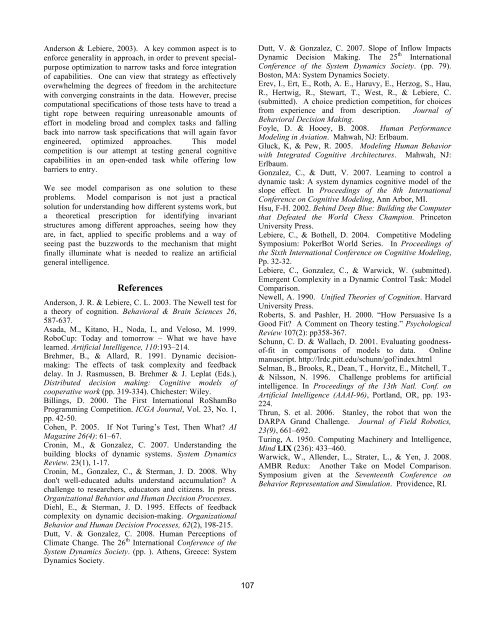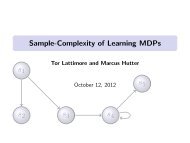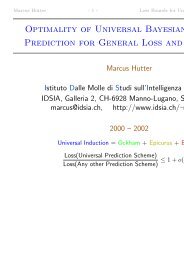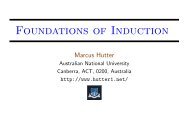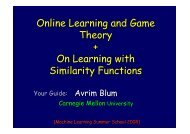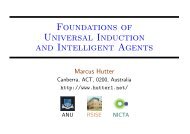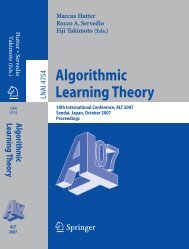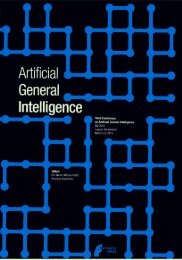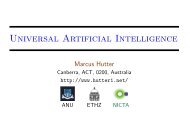A Framework for Evaluating Early-Stage Human - of Marcus Hutter
A Framework for Evaluating Early-Stage Human - of Marcus Hutter
A Framework for Evaluating Early-Stage Human - of Marcus Hutter
Create successful ePaper yourself
Turn your PDF publications into a flip-book with our unique Google optimized e-Paper software.
Anderson & Lebiere, 2003). A key common aspect is to<br />
en<strong>for</strong>ce generality in approach, in order to prevent specialpurpose<br />
optimization to narrow tasks and <strong>for</strong>ce integration<br />
<strong>of</strong> capabilities. One can view that strategy as effectively<br />
overwhelming the degrees <strong>of</strong> freedom in the architecture<br />
with converging constraints in the data. However, precise<br />
computational specifications <strong>of</strong> those tests have to tread a<br />
tight rope between requiring unreasonable amounts <strong>of</strong><br />
ef<strong>for</strong>t in modeling broad and complex tasks and falling<br />
back into narrow task specifications that will again favor<br />
engineered, optimized approaches. This model<br />
competition is our attempt at testing general cognitive<br />
capabilities in an open-ended task while <strong>of</strong>fering low<br />
barriers to entry.<br />
We see model comparison as one solution to these<br />
problems. Model comparison is not just a practical<br />
solution <strong>for</strong> understanding how different systems work, but<br />
a theoretical prescription <strong>for</strong> identifying invariant<br />
structures among different approaches, seeing how they<br />
are, in fact, applied to specific problems and a way <strong>of</strong><br />
seeing past the buzzwords to the mechanism that might<br />
finally illuminate what is needed to realize an artificial<br />
general intelligence.<br />
References<br />
Anderson, J. R. & Lebiere, C. L. 2003. The Newell test <strong>for</strong><br />
a theory <strong>of</strong> cognition. Behavioral & Brain Sciences 26,<br />
587-637.<br />
Asada, M., Kitano, H., Noda, I., and Veloso, M. 1999.<br />
RoboCup: Today and tomorrow – What we have have<br />
learned. Artificial Intelligence, 110:193–214.<br />
Brehmer, B., & Allard, R. 1991. Dynamic decisionmaking:<br />
The effects <strong>of</strong> task complexity and feedback<br />
delay. In J. Rasmussen, B. Brehmer & J. Leplat (Eds.),<br />
Distributed decision making: Cognitive models <strong>of</strong><br />
cooperative work (pp. 319-334). Chichester: Wiley.<br />
Billings, D. 2000. The First International RoShamBo<br />
Programming Competition. ICGA Journal, Vol. 23, No. 1,<br />
pp. 42-50.<br />
Cohen, P. 2005. If Not Turing’s Test, Then What? AI<br />
Magazine 26(4): 61–67.<br />
Cronin, M., & Gonzalez, C. 2007. Understanding the<br />
building blocks <strong>of</strong> dynamic systems. System Dynamics<br />
Review. 23(1), 1-17.<br />
Cronin, M., Gonzalez, C., & Sterman, J. D. 2008. Why<br />
don't well-educated adults understand accumulation? A<br />
challenge to researchers, educators and citizens. In press.<br />
Organizational Behavior and <strong>Human</strong> Decision Processes.<br />
Diehl, E., & Sterman, J. D. 1995. Effects <strong>of</strong> feedback<br />
complexity on dynamic decision-making. Organizational<br />
Behavior and <strong>Human</strong> Decision Processes, 62(2), 198-215.<br />
Dutt, V. & Gonzalez, C. 2008. <strong>Human</strong> Perceptions <strong>of</strong><br />
Climate Change. The 26 th International Conference <strong>of</strong> the<br />
System Dynamics Society. (pp. ). Athens, Greece: System<br />
Dynamics Society.<br />
107<br />
Dutt, V. & Gonzalez, C. 2007. Slope <strong>of</strong> Inflow Impacts<br />
Dynamic Decision Making. The 25 th International<br />
Conference <strong>of</strong> the System Dynamics Society. (pp. 79).<br />
Boston, MA: System Dynamics Society.<br />
Erev, I., Ert, E., Roth, A. E., Haruvy, E., Herzog, S., Hau,<br />
R., Hertwig, R., Stewart, T., West, R., & Lebiere, C.<br />
(submitted). A choice prediction competition, <strong>for</strong> choices<br />
from experience and from description. Journal <strong>of</strong><br />
Behavioral Decision Making.<br />
Foyle, D. & Hooey, B. 2008. <strong>Human</strong> Per<strong>for</strong>mance<br />
Modeling in Aviation. Mahwah, NJ: Erlbaum.<br />
Gluck, K, & Pew, R. 2005. Modeling <strong>Human</strong> Behavior<br />
with Integrated Cognitive Architectures. Mahwah, NJ:<br />
Erlbaum.<br />
Gonzalez, C., & Dutt, V. 2007. Learning to control a<br />
dynamic task: A system dynamics cognitive model <strong>of</strong> the<br />
slope effect. In Proceedings <strong>of</strong> the 8th International<br />
Conference on Cognitive Modeling, Ann Arbor, MI.<br />
Hsu, F-H. 2002. Behind Deep Blue: Building the Computer<br />
that Defeated the World Chess Champion. Princeton<br />
University Press.<br />
Lebiere, C., & Bothell, D. 2004. Competitive Modeling<br />
Symposium: PokerBot World Series. In Proceedings <strong>of</strong><br />
the Sixth International Conference on Cognitive Modeling,<br />
Pp. 32-32.<br />
Lebiere, C., Gonzalez, C., & Warwick, W. (submitted).<br />
Emergent Complexity in a Dynamic Control Task: Model<br />
Comparison.<br />
Newell, A. 1990. Unified Theories <strong>of</strong> Cognition. Harvard<br />
University Press.<br />
Roberts, S. and Pashler, H. 2000. “How Persuasive Is a<br />
Good Fit? A Comment on Theory testing.” Psychological<br />
Review 107(2): pp358-367.<br />
Schunn, C. D. & Wallach, D. 2001. <strong>Evaluating</strong> goodness<strong>of</strong>-fit<br />
in comparisons <strong>of</strong> models to data. Online<br />
manuscript. http://lrdc.pitt.edu/schunn/g<strong>of</strong>/index.html<br />
Selman, B., Brooks, R., Dean, T., Horvitz, E., Mitchell, T.,<br />
& Nilsson, N. 1996. Challenge problems <strong>for</strong> artificial<br />
intelligence. In Proceedings <strong>of</strong> the 13th Natl. Conf. on<br />
Artificial Intelligence (AAAI-96), Portland, OR, pp. 193-<br />
224.<br />
Thrun, S. et al. 2006. Stanley, the robot that won the<br />
DARPA Grand Challenge. Journal <strong>of</strong> Field Robotics,<br />
23(9), 661–692.<br />
Turing, A. 1950. Computing Machinery and Intelligence,<br />
Mind LIX (236): 433–460.<br />
Warwick, W., Allender, L., Strater, L., & Yen, J. 2008.<br />
AMBR Redux: Another Take on Model Comparison.<br />
Symposium given at the Seventeenth Conference on<br />
Behavior Representation and Simulation. Providence, RI.


